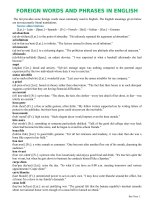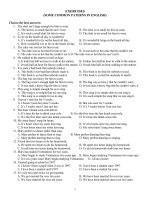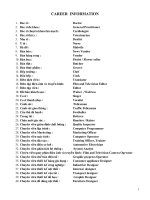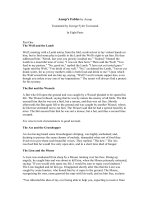short stories in English 3
Bạn đang xem bản rút gọn của tài liệu. Xem và tải ngay bản đầy đủ của tài liệu tại đây (87.26 KB, 9 trang )
Aesop’s Fables
Part Three
The Shepherd and the Wolf
A Shepherd once found the whelp of a Wolf and brought it up, and after a while taught
it to steal lambs from the neighboring flocks. The Wolf, having shown himself an apt
pupil, said to the Shepherd, "Since you have taught me to steal, you must keep a sharp
lookout, or you will lose some of your own flock."
The Father and His Two Daughters
A Man had two daughters, the one married to a gardener, and the other to a tile-maker.
After a time he went to the daughter who had married the gardener, and inquired how
she was and how all things went with her. She said, "All things are prospering with me,
and I have only one wish, that there may be a heavy fall of rain, in order that the plants
may be well watered." Not long after, he went to the daughter who had married the
tilemaker, and likewise inquired of her how she fared; she replied, "I want for nothing,
and have only one wish, that the dry weather may continue, and the sun shine hot and
bright, so that the bricks might be dried." He said to her, "If your sister wishes for rain,
and you for dry weather, with which of the two am I to join my wishes?'
The Farmer and His Sons
A father, being on the point of death, wished to be sure that his sons would give the
same attention to his farm as he himself had given it. He called them to his bedside and
said, "My sons, there is a great treasure hid in one of my vineyards." The sons, after his
death, took their spades and mattocks and carefully dug over every portion of their land.
They found no treasure, but the vines repaid their labor by an extraordinary and
superabundant crop.
The Crab and Its Mother
A Crab said to her son, "Why do you walk so one-sided, my child? It is far more
becoming to go straight forward." The young Crab replied: "Quite true, dear Mother;
and if you will show me the straight way, I will promise to walk in it." The Mother tried
in vain, and submitted without remonstrance to the reproof of her child.
Example is more powerful than precept.
The Heifer and the Ox
A Heifer saw an Ox hard at work harnessed to a plow, and tormented him with
reflections on his unhappy fate in being compelled to labor. Shortly afterwards, at the
harvest festival, the owner released the Ox from his yoke, but bound the Heifer with
cords and led him away to the altar to be slain in honor of the occasion. The Ox saw
what was being done, and said with a smile to the Heifer: "For this you were allowed to
live in idleness, because you were presently to be sacrificed."
The Swallow, the Serpent, and the Court of Justice
A Swallow, returning from abroad and especially fond of dwelling with men, built
herself a nest in the wall of a Court of Justice and there hatched seven young birds. A
Serpent gliding past the nest from its hole in the wall ate up the young unfledged
nestlings. The Swallow, finding her nest empty, lamented greatly and exclaimed: "Woe
to me a stranger! that in this place where all others' rights are protected, I alone should
suffer wrong."
The Thief and His Mother
A Boy stole a lesson-book from one of his schoolfellows and took it home to his
Mother. She not only abstained from beating him, but encouraged him. He next time
stole a cloak and brought it to her, and she again commended him. The Youth,
advanced to adulthood, proceeded to steal things of still greater value. At last he was
caught in the very act, and having his hands bound behind him, was led away to the
place of public execution. His Mother followed in the crowd and violently beat her
breast in sorrow, whereupon the young man said, "I wish to say something to my
Mother in her ear." She came close to him, and he quickly seized her ear with his teeth
and bit it off. The Mother upbraided him as an unnatural child, whereon he replied,
"Ah! if you had beaten me when I first stole and brought to you that lesson-book, I
should not have come to this, nor have been thus led to a disgraceful death."
The Old Man and Death
An Old Man was employed in cutting wood in the forest, and, in carrying the faggots to
the city for sale one day, became very wearied with his long journey. He sat down by
the wayside, and throwing down his load, besought "Death" to come. "Death"
immediately appeared in answer to his summons and asked for what reason he had
called him. The Old Man hurriedly replied, "That, lifting up the load, you may place it
again upon my shoulders."
The Fir-Tree and the Bramble
A Fir-Tree said boastingly to the Bramble, "You are useful for nothing at all; while I
am everywhere used for roofs and houses." The Bramble answered: 'You poor creature,
if you would only call to mind the axes and saws which are about to hew you down,
you would have reason to wish that you had grown up a Bramble, not a Fir-Tree."
Better poverty without care, than riches with.
The Mouse, the Frog, and the Hawk
A Mouse who always lived on the land, by an unlucky chance formed an intimate
acquaintance with a Frog, who lived for the most part in the water. The Frog, one day
intent on mischief, bound the foot of the Mouse tightly to his own. Thus joined
together, the Frog first of all led his friend the Mouse to the meadow where they were
accustomed to find their food. After this, he gradually led him towards the pool in
which he lived, until reaching the very brink, he suddenly jumped in, dragging the
Mouse with him. The Frog enjoyed the water amazingly, and swam croaking about, as
if he had done a good deed. The unhappy Mouse was soon suffocated by the water, and
his dead body floated about on the surface, tied to the foot of the Frog. A Hawk
observed it, and, pouncing upon it with his talons, carried it aloft. The Frog, being still
fastened to the leg of the Mouse, was also carried off a prisoner, and was eaten by the
Hawk.
Harm hatch, harm catch.
The Man Bitten By a Dog
A Man who had been bitten by a Dog went about in quest of someone who might heal
him. A friend, meeting him and learning what he wanted, said, "If you would be cured,
take a piece of bread, and dip it in the blood from your wound, and go and give it to the
Dog that bit you." The Man who had been bitten laughed at this advice and said, "Why?
If I should do so, it would be as if I should beg every Dog in the town to bite me."
Benefits bestowed upon the evil-disposed increase their means of injuring you.
The Two Pots
A river carried down in its stream two Pots, one made of earthenware and the other of
brass. The Earthen Pot said to the Brass Pot, "Pray keep at a distance and do not come
near me, for if you touch me ever so slightly, I shall be broken in pieces, and besides, I
by no means wish to come near you."
Equals make the best friends.
The Wolf and the Sheep
A Wolf, sorely wounded and bitten by dogs, lay sick and maimed in his lair. Being in
want of food, he called to a Sheep who was passing, and asked him to fetch some water
from a stream flowing close beside him. "For," he said, "if you will bring me drink, I
will find means to provide myself with meat." "Yes," said the Sheep, "if I should bring
you the draught, you would doubtless make me provide the meat also."
Hypocritical speeches are easily seen through.
The Aethiop
The purchaser of a black servant was persuaded that the color of his skin arose from dirt
contracted through the neglect of his former masters. On bringing him home he resorted
to every means of cleaning, and subjected the man to incessant scrubbings. The servant
caught a severe cold, but he never changed his color or complexion.
What's bred in the bone will stick to the flesh.
The Fisherman and His Nets
A Fisherman, engaged in his calling, made a very successful cast and captured a great
haul of fish. He managed by a skillful handling of his net to retain all the large fish and
to draw them to the shore; but he could not prevent the smaller fish from falling back
through the meshes of the net into the sea.
The Huntsman and the Fisherman
A Huntsman, returning with his dogs from the field, fell in by chance with a Fisherman
who was bringing home a basket well laden with fish. The Huntsman wished to have
the fish, and their owner experienced an equal longing for the contents of the game-bag.
They quickly agreed to exchange the produce of their day's sport. Each was so well
pleased with his bargain that they made for some time the same exchange day after day.
Finally a neighbor said to them, "If you go on in this way, you will soon destroy by
frequent use the pleasure of your exchange, and each will again wish to retain the fruits
of his own sport."
Abstain and enjoy.
The Old Woman and the Wine-Jar
An Old Woman found an empty jar which had lately been full of prime old wine and
which still retained the fragrant smell of its former contents. She greedily placed it
several times to her nose, and drawing it backwards and forwards said, "O most
delicious! How nice must the Wine itself have been, when it leaves behind in the very
vessel which contained it so sweet a perfume!"
The memory of a good deed lives.
The Fox and the Crow
A Crow having stolen a bit of meat, perched in a tree and held it in her beak. A Fox,
seeing this, longed to possess the meat himself, and by a wily stratagem succeeded.
"How handsome is the Crow," he exclaimed, in the beauty of her shape and in the
fairness of her complexion! Oh, if her voice were only equal to her beauty, she would
deservedly be considered the Queen of Birds!" This he said deceitfully; but the Crow,
anxious to refute the reflection cast upon her voice, set up a loud caw and dropped the
flesh. The Fox quickly picked it up, and thus addressed the Crow: "My good Crow,
your voice is right enough, but your wit is wanting."
The Two Dogs
A Man had two dogs: a Hound, trained to assist him in his sports, and a Housedog,
taught to watch the house. When he returned home after a good day's sport, he always
gave the Housedog a large share of his spoil. The Hound, feeling much aggrieved at
this, reproached his companion, saying, "It is very hard to have all this labor, while you,
who do not assist in the chase, luxuriate on the fruits of my exertions." The Housedog
replied, "Do not blame me, my friend, but find fault with the master, who has not taught
me to labor, but to depend for subsistence on the labor of others."
Children are not to be blamed for the faults of their parents.
The Stag in the Ox-Stall
A Stag, roundly chased by the hounds and blinded by fear to the danger he was running
into, took shelter in a farmyard and hid himself in a shed among the oxen. An Ox gave
him this kindly warning: "O unhappy creature! why should you thus, of your own
accord, incur destruction and trust yourself in the house of your enemy?' The Stag
replied: "Only allow me, friend, to stay where I am, and I will undertake to find some
favorable opportunity of effecting my escape." At the approach of the evening the
herdsman came to feed his cattle, but did not see the Stag; and even the farm-bailiff
with several laborers passed through the shed and failed to notice him. The Stag,
congratulating himself on his safety, began to express his sincere thanks to the Oxen
who had kindly helped him in the hour of need. One of them again answered him: "We
indeed wish you well, but the danger is not over. There is one other yet to pass through
the shed, who has as it were a hundred eyes, and until he has come and gone, your life
is still in peril." At that moment the master himself entered, and having had to complain
that his oxen had not been properly fed, he went up to their racks and cried out: "Why is
there such a scarcity of fodder? There is not half enough straw for them to lie on. Those
lazy fellows have not even swept the cobwebs away." While he thus examined
everything in turn, he spied the tips of the antlers of the Stag peeping out of the straw.
Then summoning his laborers, he ordered that the Stag should be seized and killed.
The Hawk, the Kite, and the Pigeons
The Pigeons, terrified by the appearance of a Kite, called upon the Hawk to defend
them. He at once consented. When they had admitted him into the cote, they found that
he made more havoc and slew a larger number of them in one day than the Kite could
pounce upon in a whole year.
Avoid a remedy that is worse than the disease.
The Widow and the Sheep
A certain poor widow had one solitary Sheep. At shearing time, wishing to take his
fleece and to avoid expense, she sheared him herself, but used the shears so unskillfully
that with the fleece she sheared the flesh. The Sheep, writhing with pain, said, "Why do
you hurt me so, Mistress? What weight can my blood add to the wool? If you want my
flesh, there is the butcher, who will kill me in an instant; but if you want my fleece and
wool, there is the shearer, who will shear and not hurt me."
The least outlay is not always the greatest gain.
The Wild Ass and the Lion
A Wild Ass and a Lion entered into an alliance so that they might capture the beasts of
the forest with greater ease. The Lion agreed to assist the Wild Ass with his strength,
while the Wild Ass gave the Lion the benefit of his greater speed. When they had taken
as many beasts as their necessities required, the Lion undertook to distribute the prey,
and for this purpose divided it into three shares. "I will take the first share," he said,
"because I am King: and the second share, as a partner with you in the chase: and the
third share (believe me) will be a source of great evil to you, unless you willingly resign
it to me, and set off as fast as you can."









